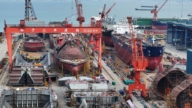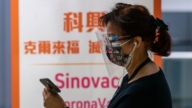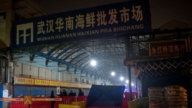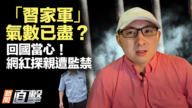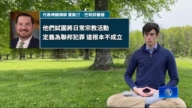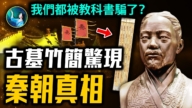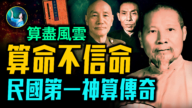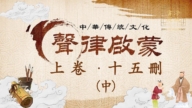【新唐人2013年05月02日讯】关于中共官员财产公示的话题由来已久,尤其在中共新领导人上台后高调“反腐”的背景下,中国民间要求官员公开财产的呼声更是一浪高过一浪。最近大陆媒体传出,中央纪委正在研究全国层面的抽查方案,至少有3种方案备选,但由于意见还不统一,出台时间仍不确定。
大陆《南方都市报》引述中纪委的消息指称,全国官员财产申报抽查方案,目前至少有3种办法纳入中纪委的考虑范围,一是,选定一定的比例随机抽查。二是采用“新人新办法、老人老办法”,对预备提拔的干部进行抽查。第三种办法是,当有线索检举某些干部可能存在腐败行为时,对这批干部的申报内容进行核查。
一直积极呼吁官员申报财产的大陆作家阮云华表示,从这三个方案可以看出,当局没有诚意,没有把公民的想法当回事,还在回避矛盾。
大陆作家阮云华:“随机抽查什么意思,那有些人抽查不到了,他就可以躲过去了,有很多暗箱操作甚至有可能,你为什么要有选择性的做呢﹖它无非是在回避矛盾,回避公民的诉求,他这样做的目地,无非是想一方面应付公民的要求,另外一方面,可以回避他们那个既得利益阶层的矛盾。”
79年大陆“民主墙”创办人之一蔡桂华认为,中纪委是一个怪胎的体制。
79年大陆“民主墙”创办人之一蔡桂华:“中共中央集团代表了最高组织领导一切。那么这样一个组织里面滋生出来的一个中纪委,去调查党委领导下的一级级的官员,我觉得这是不可能的。真正要行之有效,我觉得应该是撇开党领导一切、党调查一切这种不正常的中国行政体系,真正的让司法独立去进行调查。只有党外人士去监督党内人士,这个还有一点可行性。”
近年来,民间要求官员公开财产的呼声不断,今年3月,北京民众在街头拉横幅,要求官员财产公示遭打压,北京维权律师丁家喜、以及维权人士赵常青和孙含会被当局抓捕。4月21号,江西新余独立参选人与广东及陕西维权人士一起,举牌要求官员公示财产。
今年1月,十八届中纪委二次全会公报指出,要“认真执行领导干部报告个人有关事项制度,并开展抽查核实工作”。
不过,广东省人大代表叶鹏智反弹提出,官员也是人,也有隐私,官员不是老百姓的奴隶。他质疑,有法律依据要求官员公开财产吗?他表示,可以向组织申报财产,但不一定对公众公开。
而时事评论员林子旭指出,中共内部腐败官员多如牛毛,如果按照第一个方案按一定比例随机抽查,整个中共官场必然人心惶惶,随之出现的反弹也必然非常强烈。
时事评论员林子旭:“按照第二个方案准备提拔的干部抽查,大家知道在中共的官场能被列为提拔对像的人,往往都是后台很硬,动这些人牵扯的面就会非常广,难度也会非常的大。按照第三个方案对被检举的人进行调查,中国的这些网民,就会在微博上开足马力爆料,这样的话,中共的局面就会变得非常被动,甚至失控,很有可能动摇了中共的根。”
林子旭认为,中共谈干部申报财产只是在忽悠老百姓,除非他们不想保中共这个体制。不过,林子旭观察,现在的中共体制已经千疮百孔,牵一发就会动全身,任何改变都可能带来连锁反应,最后导致中共崩盘。
采访编辑/常春 后制/李勇
CCP Faces Three Options for Official Asset Declaration
In China, the public have been continually asking officials to
declare their assets, mainly after the new leaders took office.
Under the Chinese Communist Party(CCP)’s anti-corruption
campaign, the voices of the people are getting louder.
Recently, rumors from mainland media are saying that
the Central Commission for Discipline Inspection (CCDI)
is studying a program of nationwide checks, although
it’s not yet certain when they will be introduced.
According to the Southern Metropolis Daily,
the CCDI now have three options.
1—randomly check a certain proportion of officials;
2—apply the new method to only new officials
and keep the old method for veteran officials;
3—investigate only when there are reports of corruption.
Ruan Yunhua, mainland writer and advocate of official
asset declaration, comments that from the three options,
one can tell that the CCP authorities are not sincere, but are
trying to avoid the problem and don’t take citizens seriously.
[Ruan Yunhua]: “What does ‘random check’mean?—
that some officials can avoid being checked—
there’re many variations in operation;
why do they have to do the checks selectively?
It’s nothing more than avoiding problems and evading
public demands—what will they accomplish?
Put simply, on one hand they want to cope with the public
and on the other hand they want to avoid conflicts,
while also protecting their personal vested interests."
Cai Guihua, one of the founders of Democracy Wall in 1979
believes that the CCDI’s system is deformed.
[Cai Guihua]: “The CCP Central Committee represents
the highest organizational leadership and the CCDI is within it;
it’s impossible to ask the CCDI to investigate party members.
To really achieve effectiveness, an independent judiciary unit
with non-party personage must supervise all investigations."
In recent years, the public have been continually
asking officials to declare their assets.
In March, 2013, Beijing citizens were suppressed for holding
banners on the streets which asked officials to declare assets,
and officials arrested a few human rights activists.
On April 21st, an independent candidate in Jiangxi Province
and other human rights activists held up placards,
requesting officials to declare their assets.
In January 2013, during the 18th Congress,
the CCDI said that
leading cadres should report relevant personal matters
to the system and carry out random checks.
But Ye Pengzhi, representative of Guangdong
Provincial People’s Congress, argued that
officials are also people and should be allowed
to have their privacy;
they can declare their assets to the organization,
but not to the public.
Political commentator Lin Zixu says,
corrupt officials are abundant;
if random checks apply only to a certain portion of officials,
all of them will be in a sense of panic and the negative reactions will be very strong.
[Lin Zixu]: “With the second option of only checking
cadres who are set to be promoted—
such people normally have a very strong background,
so it will involve many people and be harder.
But taking the third option will cause netizens in China
to operate in full capacity to break news on their microblogs,
thus causing the central government to become very passive,
lose its control and even have its foundation shaken."
Lin Zixu believes that when authorities talk about
the declaration of assets, they are fooling common citizens;
for real change, they must be ready to give up the system.
However, according to Lin’s observations,
the CCP is riddled with problems—any minute change
is likely to create a domino effect, leading to its collapse.




